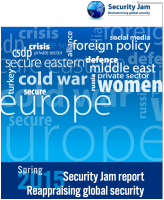 Report embargoed until March 4 Report embargoed until March 4 SDA Security Jam report to be published on March 4: Ten priorities for Stoltenberg and Mogherini A recommendation from the “Security Jam” became policy last week as world leaders committed to fight terrorist propaganda at the Washington Summit on Countering Violent Extremism. The world’s top security experts who participated in the 2014 “Security Jam”, organised by the Security and Defence Agenda (now part of Friends of Europe) also urged NATO Secretary General Jens Stoltenberg and EU foreign and security policy chief Federica Mogherini to set up a security organisation in the Middle East, to create an EU consensus on immigration, asylum and human trafficking, to open up jobs for women in intelligence operations, and to create an international ‘Cyberpol’ agency. This is my main contribution to the report itself: Defining concrete organising concepts for EU security policy The problem, as illustrated by the EU discussion forum in the Jam, is not that a ‘beloved child has many names.’ It is rather that many concepts in the European security debate have over the years been contaminated and that we again risk starting a new conceptual debate leading nowhere. Several senior military participants in the Jam — both former and current heads of the EU military staff — proposed in their contributions a strategy for the Comprehensive Approach with a stronger role for the military. But clearly the comprehensive approach has not become a mobilising concept generating much enthusiasm, although the new HR/VP has committed herself to continue efforts in this direction. It was noteworthy that the case for a new European global or security strategy attracted more attention by Jam participants. This is interesting because of the recent controversy around this discussion. In particular, larger European member states have hesitated to enter into a new, potentially divisive, debate. The previous High Representative worried about the feasibility of such a project, and a similar attempt in 2008, just before the entry into force of the Lisbon Treaty, more or less failed. The Jam, however, shows that whatever you call it, there is a need for more strategic reflection on EU security, and not only on soft power. The issue is not perhaps so much the outcome of such a process, but rather the process itself of operationalising clear European policies in various areas. The new organisation of the Commission with the HR/VP joining ranks, with her office moving to the Commission Berlaymont building and coordinating a cluster of Commissioners, requires a new type of powerful organising concepts and — as several participants noted — a new type of initiative. While American policies were severely criticised for a lack of perspective, Europe cannot claim great success either in terms of strategic foresight. The foreseen resumption of a strategic debate in the EU will not happen without acrimony. But, as many noted, challenges not only in the EU’s neighbourhood but worldwide require a new concerted effort. Surely Europe can do better. We also need, according to several participants, new initiatives by the European institutions in security policy. With very few exceptions, this has been a taboo notion in the development of the EU’s common security and defence policy. Instead, EU member states have competed in micromanaging the EU institutions. Such micromanagement is impossible however, not least if the Commission is at the same time asked to come on board with all its thematic expertise and resources. Ukraine and the Horn of Africa demonstrate the importance of the non-military vectors of security policy. It is only once these are properly integrated into an overall approach that the EU can hope to play a role also on the military side in close cooperation with NATO, the OSCE and the United Nations. It is not impossible that the current trend towards renationalisation in Europe will be reversed in the area of security policy as the number of overwhelming crises affecting Europe continues to accumulate. Lars-Erik Lundin Distinguished Associate Fellow, European Security Programme, Stockholm International Peace Research Institute (SIPRI)
0 Comments
Leave a Reply. |
Archives
May 2015
Categories |
 RSS Feed
RSS Feed